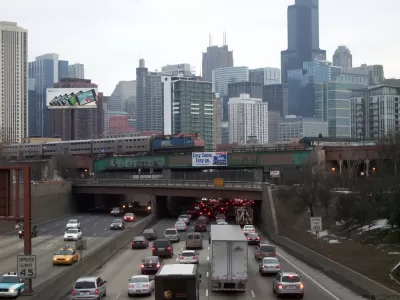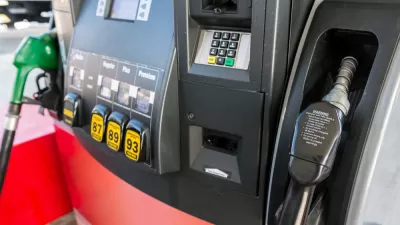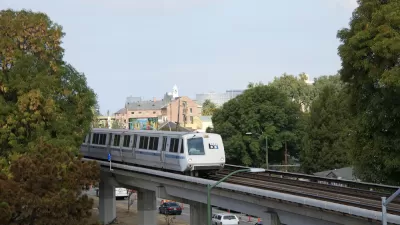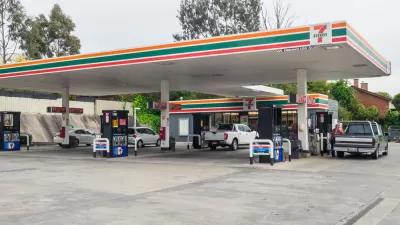Instead of voting on new taxes to reduce transportation revenue shortfalls, Illinois voters will decide on a constitutional amendment to ensure that transportation fees and taxes are only spent on roads and transit, the so-called "lockbox" measure.

Unable or unwilling to raise the 31 cent gas tax [per API], not raised since 1991, Illinois legislators passed "common sense" legislation, in the words of Sen. Bill Haine, D-Alton, one of the many sponsors of HJRCA 36. While it does nothing to increase transportation revenues, it creates a virtual trust fund or budget "lock-box," like those found in many other states and the federal government, to ensure that transportation user fee and tax revenues are spent only on transportation-related purposes.
"The effort comes as Illinois' infrastructure wish list continues to grow, but money earmarked for transportation projects is routinely diverted to fill other budget holes," writes Monique Garcia, state government and political reporter for the Chicago Tribune. "While some advocacy groups have called for a gas tax increase, raising taxes is politically unpopular during an election year."
Chicago-based Metropolitan Planning Council (MPC), an independent, nonprofit, nonpartisan organization, called for a 30-cent gas tax and vehicle registration fee increases in a new report posted here last month. MPC Senior Fellow James R. Reilly urges a "yes" vote on the lockbox measure.
History suggests voters would be wise to approve this amendment. Time and again, particularly in years when state revenues have been tight, the General Assembly has dipped into what’s known as “the road fund.”
Unlike more road-oriented transportation constitutional amendments, such as California's Article XIX, far more transportation purposes are allowed under Constitutional Amendment 36 according to Garcia.
[Lockbox] money could then only be spent on road construction and repair, enforcing traffic laws, paying off debt on transit projects and even costs associated with workers injured on the job. The change would not apply to state and local sales taxes that often are added on top of the gas tax motorists pay at the pump.
Garcia notes that the lockbox could remove one obstacle to the passage of a potential future gas tax hike — that transportation revenue would be used as intended rather than diverted to more pressing budgetary needs. However, as noted countless times by Planetizen, the norm is for General Fund money to be diverted to transportation projects, not vice-versa.
As posted here last month, the Prairie State is also considering implementing a vehicle mile traveled fee program to deal with the transportation shortfall.
Amendment 36 would be "the only legislatively-approved amendment voters will get a chance to weigh in on this fall," adds Garcia.
The measure appears in Ballotpedia. "If you know of any opposition to this measure, please contact [email protected]," notes the listing.
Hat tip to The AASHTO Daily Transportation Update.
FULL STORY: Gas tax 'lockbox' constitutional amendment to appear on Nov. 8 ballot

Coming Soon to Ohio: The Largest Agrivoltaic Farm in the US
The ambitious 6,000-acre project will combine an 800-watt solar farm with crop and livestock production.

Pennsylvania Mall Conversion Bill Passes House
If passed, the bill would promote the adaptive reuse of defunct commercial buildings.

U.S. Supreme Court: California's Impact Fees May Violate Takings Clause
A California property owner took El Dorado County to state court after paying a traffic impact fee he felt was exorbitant. He lost in trial court, appellate court, and the California Supreme Court denied review. Then the U.S. Supreme Court acted.

Divvy Introduces E-Bike Charging Docks
New, circular docks let e-bikes charge at stations, eliminating the need for frequent battery swaps.

How Freeway Projects Impact Climate Resilience
In addition to displacement and public health impacts, highway expansions can also make communities less resilient to flooding and other climate-related disasters.

California Grid Runs on 100% Renewable Energy for Over 9 Hours
The state’s energy grid was entirely powered by clean energy for some portion of the day on 37 out of the last 45 days.
City of Costa Mesa
Licking County
Barrett Planning Group LLC
HUD's Office of Policy Development and Research
Mpact Transit + Community
HUD's Office of Policy Development and Research
Tufts University, Department of Urban and Environmental Policy & Planning
City of Universal City TX
ULI Northwest Arkansas
Urban Design for Planners 1: Software Tools
This six-course series explores essential urban design concepts using open source software and equips planners with the tools they need to participate fully in the urban design process.
Planning for Universal Design
Learn the tools for implementing Universal Design in planning regulations.


























